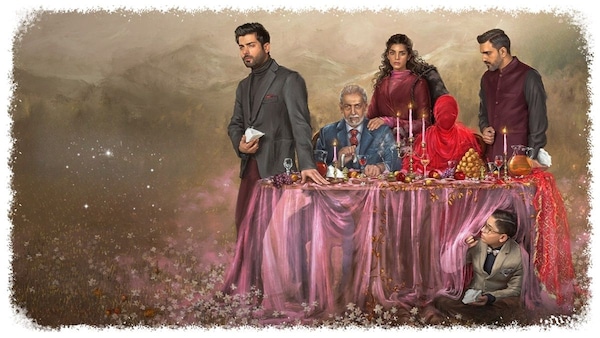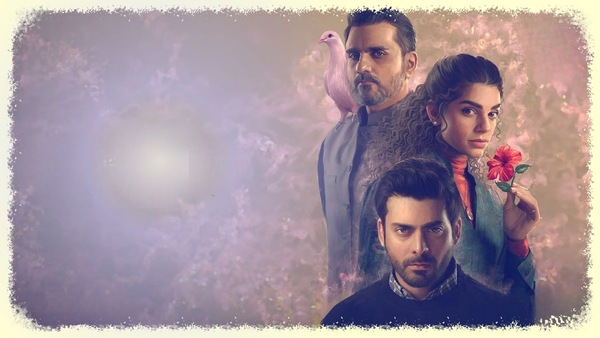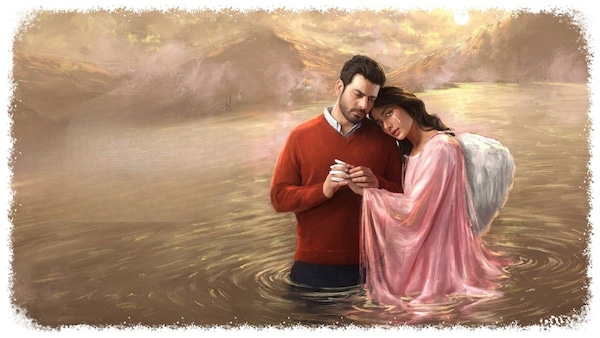Barzakh Is An Ambitious Cultural Feat Of Literary Proportions
Asim Abbasi's Barzakh isn’t anchored by a female cast, yet it's shaped by their resilience. He has managed to upgrade his own language, with the idiom of wonder, deceit, and even magic.

Promo poster for Barzakh
Last Updated: 04.18 PM, Jul 19, 2024
“WHAT COMES AFTER DEATH?" a young kid asks his father, rhetorically, in Zee5’s Barzakh. “A necrophiliac,” he follows up. Rather than recoil in horror, the father responds with bemusement. The sequence hints at the skewed moral compass of a show where masculinity has carved the terrain and continues to control the borders. People are casually offensive, unintentionally vulgar and often unhinged in this world that maps itself to the hard edges of broken yet bullish men. Set in the stunning Hunza valley of Pakistan, Barzakh exhibits myths, indulges shamans, plays with hallucinatory trips and embodies a broody, magical realm. This is a poetic, at times sullen trip through the ridges and rifts of familial relationships and the many ways culture can cede itself to the ego of men. It might be slow, and ponderous at times, but it’s thoroughly absorbing as a chronicle of loss told through the units of closeted time.
Fawad Khan plays Shehryar, a former psychiatrist who has quit practice after the death of his wife. He returns to his father Jafar’s (Salman Shahid) valley-set resort to attend to the puzzling eventuality of him trying to marry the ghost of his first love. Shehryar also reunites with his siblings, Saifullah (M Fawad Khan) and Scheherezade (Sanam Saeed). The premise suggests the preposterousness of a Lanthimos film and the eccentricity of a Marquez novel. As their father brazenly declares the motivations of his bizarre endeavour, the siblings bond over their late mother, and the inadequacies that may have forced her into an early grave. Secrets, envy, guilt and distrust tumble out of the closet in a show that uses the scenic and the serene to essay a kind of seductive distress, shared across the aisles of a family tree.

Director Asim Abbasi, who returns to a familiar trope of difficult homecomings (Cake) gives this well-trodden territory an exquisite audio-visual makeover; with sounds and sights that place notional ideas of beauty alongside colloquial realities of the beast within. We see fairies, blood vines and mythical characters all gather in a closely-knit community that lives, mourns and debates as a collective. Naturally, a man’s pervasive ideas about his self are bound to disrupt a relatively low-key, yet surreal corner of the world. There is something about the mountains, their nakedness that perpetuates this contrasting world of woe blanketed by the wonder of it all. In one scene from the second episode, two men glide up a trail with their ageing bicycles. They are overwhelmed by the magnificence of a snow-lathered peak. It’s one of those things you’ve come to expect of the milieu, but Abbasi steers clear of awe and obsession. This beauty has a haunting quality about it.
There are obviously sub-plots to Barzakh, that include murder, closeted sexuality and unaddressed trauma. The zealousness of the family patriarch might drive the story’s edges, but it’s the siblings who add to the depth and meaning. What does it mean to be a man, especially in conservative corners of the world? Much like his breakthrough series Churails, Abbasi's Barzakh seamlessly translates across the border, as a show capable of representing perverse and coarse cultural heritage from different pockets of India. The kind raised by men and nursed by reluctant, unheard women. Unlike his first two projects, Abbasi’s latest isn’t anchored by a female cast but is in some ways, still shaped by their resilience. In some sense, the director has managed to upgrade his own language, with the idiom of wonder, deceit, and even magic.

For anything that boasts of a Fawad Khan, the spotlight automatically shifts to his performance. Here, he is an eloquent but curt embodiment of displacement. A megastar who casually dissolves into the world. Shehryar has outgrown his roots in terms of stature, but his emotional self could still be found littered over these mountains. His relationship with his son is as fascinating, as Scheherezade’s softness is perturbing. It’s like watching behavioural defects trickle down the family tree, to branch into a new kind of sour fruit. At times the brooding feels a bit sluggish. But it largely tapers around whatever crack of momentum the show is likely to slip into.

Barzakh is a visual treat. The overarching themes of dysfunctional families reuniting to examine a dented past feel familiar, but the grammar and treatment steer towards the surreal and the supernatural. The trademark wit that has underlined much of Abbasi’s writing – his greatest strength actually – sort of gets lost in a thicket of exceptional imagery at times. But the six-episode series knows its way around the forest of awe and dreams. It has the conviction to sow mystery and drama while also brushing past your eyes like a seductive, visual trip. It takes immense courage to locate a story of such tense personal knots within the parable of mountains and the myths they farm. And yet Fawad, Abbasi and co manage to pull off the improbable in what is an ambitious cultural feat of literary proportions.
Barzakh is currently streaming on Zee5.
